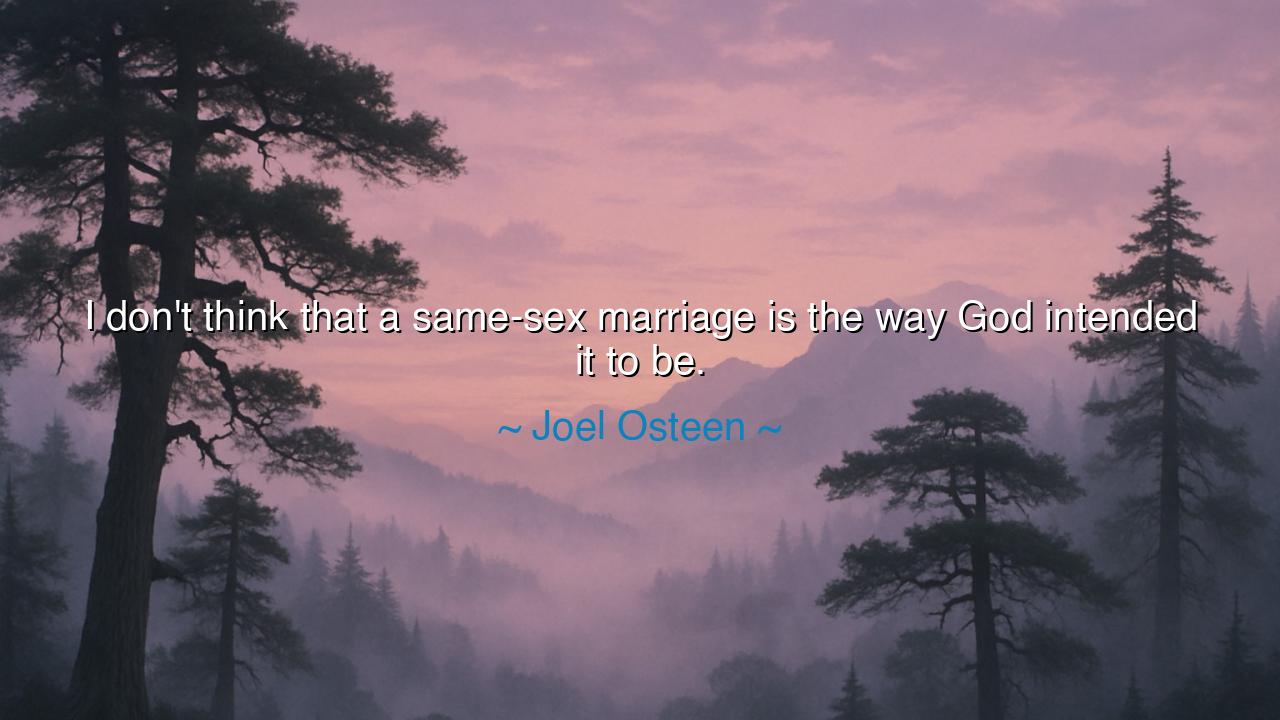
I don't think that a same-sex marriage is the way God intended it






In the ancient words of Joel Osteen, we are invited into a reflection on the nature of marriage, and specifically, on the question of its sanctity and divine intent: "I don’t think that a same-sex marriage is the way God intended it to be." These words carry with them the weight of centuries of tradition, rooted in a vision of marriage that spans back through time, across cultures, and through sacred texts. Yet, even as we ponder the foundations of these beliefs, we must also face the inevitable truth that human understanding of marriage, of love, and of God’s will is constantly evolving.
In the ancient world, marriage was often seen as the cornerstone of societal order and moral structure, an institution forged in the fires of tradition and faith. The idea of God’s will was, in many societies, intertwined with the institution of marriage, as seen in the biblical texts that describe the union of a man and a woman as the very foundation of human existence. Genesis tells of the creation of Eve from Adam, a moment that has often been interpreted as God’s design for marriage—one man and one woman united in a bond of love and purpose. To some, this was the template for all future unions, and any deviation from this model was seen as an affront to divine order. Osteen’s words echo this belief, suggesting that same-sex marriages fall outside of this divine vision, as they deviate from what he perceives as God’s plan for humanity.
Yet, as with all deeply held beliefs, we must ask ourselves whether our understanding of God’s will is absolute, or whether it is shaped by the limits of our own time and culture. The ancient Greeks, with their varied views on love and partnership, also held that marriage was a sacred institution. However, their views were far from uniform. In Athens, for example, marriage was primarily about the continuity of the family line, while in other city-states, relationships between men could be seen as deeply spiritual and intellectual. It was a world where love and companionship took many forms, and where the understanding of divine will was not confined to one single interpretation. As we examine these ancient beliefs, we are reminded that human understanding of relationships, marriage, and divine law is ever-shifting, shaped by the currents of culture, history, and evolution in thought.
In more modern times, the question of same-sex marriage has sparked a revolution in how we view love, partnership, and commitment. The ancient wisdom that guided societies of the past may have been grounded in divine commandments, but the unfolding of human rights and equality in recent centuries calls us to challenge the status quo. LGBTQ+ advocates, from Harvey Milk to Marsha P. Johnson, have fought for the right to love and be loved without fear of discrimination. They have sought to redefine marriage not as a one-size-fits-all concept but as a fundamental right that transcends sexual orientation. In this light, same-sex marriage becomes not a deviation from divine intent but a fulfillment of the sacred promise of love, equality, and freedom—values that are rooted in the deepest teachings of humanity.
The lesson that emerges from these discussions is not simply about the validity of one belief over another but about the power of love to shape the world. Whether we agree or disagree with Osteen’s views, we must recognize that love in all its forms—whether it is between a man and a woman, two men, or two women—has the power to transform lives. God’s will, as many believe, is not always about rigidly adhering to laws but about embracing the love and compassion that connects all people. Marriage, in this sense, is not just about following rules but about honoring the sacred union between two souls, regardless of their gender or sexual orientation.
As we navigate this complex conversation, we must also look to our own hearts. What does it mean to honor God’s will in our relationships, in our love, and in our treatment of others? The answer lies not in rigid dogma or the fear of change but in the empathy and respect we extend to one another. It is not our place to judge the love that others share, but to honor their humanity and the sacredness of their connection. True love is not about fitting into prescribed molds but about the authentic, vulnerable bond between two people who choose each other, through all circumstances.
In the end, we must carry Osteen’s words with a spirit of both reflection and compassion. The world is ever-changing, and the idea of marriage—and its place in God’s plan—may shift as we grow in wisdom and understanding. Let us not forget that the essence of divine love lies not in conformity to a single vision but in the respect and dignity we offer each other, as we walk together toward a more just and compassionate world. Let us act with love, guided by a deep belief in the equality and worth of every human being, as we embrace all forms of love that bring us closer to the divine truth.






AAdministratorAdministrator
Welcome, honored guests. Please leave a comment, we will respond soon